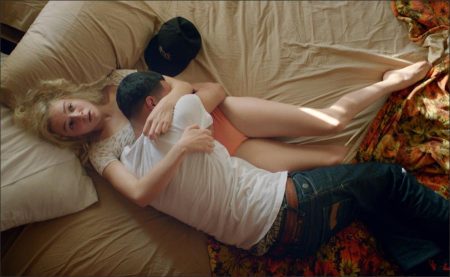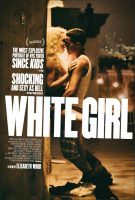White Girl Movie Storyline. Equipped with platinum blond hair and a winning smile, NYC college girl Leah seeks out pleasure in any form. Between getting high with her roommate, Katie and snorting lines with her boss, Kelly she falls for Blue, a young man dealing drugs on her corner. Within days, the two are selling dime bags to her boss and his downtown friends and living the high life. Summer love crashes to a halt when Blue is arrested and she is left with a serious bag of his coke. Enlisting the help of an overpriced lawyer George, she finds herself deep in debt as she crosses all boundaries to get Blue back.
White Girl is an American film written and directed by Elizabeth Wood in her directorial debut. It stars Morgan Saylor, Brian Marc, India Menuez, Adrian Martinez, Anthony Ramos, Ralph Rodriguez, Annabelle Dexter-Jones, Chris Noth and Justin Bartha. The film had its world premiere at the Sundance Film Festival on January 23, 2016. The film was released on September 2, 2016 by FilmRise.
White Girl Review
The debauched portrait of a New York college freshman who does everything in her power to get her drug-dealer boyfriend out of jail.
Even if “White Girl” weren’t inspired by incidents in writer-director Elizabeth Wood’s life, it would be a hard pill to swallow. The story of a New York college freshman who hooks up with a Puerto Rican drug dealer, sees him arrested before her very eyes and then proceeds to sell his monster stash of coke in order to pay for his release, Wood’s semi-autobiographical shocker is wall-to-wall drugs and depravity, offered up as proof that white girls can be as “hard” as the best of them.
Served up as an extreme survival story, Wood’s gut-wrenching experience packs the same sickening effect as past Killer Films productions “Party Monster” and “Kids,” albeit with even less social value. The sensational style and subject will surely be a selling point, though in the end, such rampant negativity serves little purpose other than to establish Wood’s reputation.
In short, there can be no doubt that Wood represents a brave new voice, just as her onscreen proxy, Morgan Saylor (a petite, doe-eyed blonde best known for Showtime’s “Homeland”), more than proves her fearless attitude toward degrading herself onscreen. And yet, neither one is the “white girl” to which the film’s title alludes. That would be the kilo of cocaine that gets sniffed, sold and sprinkled on genitalia over the course of the film.
Still, by plunging our faces into a cesspool of reprehensible behavior, these two nervy female talents examine the paradox of being a carefree teenager smart enough to be accepted into university, but so idiotic in her life decisions that the worst possible outcomes (arrest, rape, murder) start to feel predictable after a point. At any given moment, ask yourself, “What’s the worst that can happen?” and as the worst proceeds to unfold, this otherwise unbearably realistic horror show actually starts to feel like a comedy.
Certainly it starts on a cheeky enough note, with strange zither music serving up its ethereal mermaid song as Leah (Saylor, in hooker-cut running shorts) and best friend Katie (India Menuez, even more obliviously doll-like) attempt to move into a trashy Queens apartment, making a hilarious spectacle of themselves in front of three bemused Latino neighbors. The laughter dries up fast when, having exhausted her supply of pot, Leah heads downstairs to score some weed from the macho trio always hanging around in front of their apartment.
Hitting it off with the group’s head dealer, Blue (rapper Brian “Sene” Marc), Leah fends off his first attempt to feel her up, only to have Wood jump-cut forward to a scene of them rutting like animals in the alley. This ain’t exactly the stuff of which love stories are made, though the pair have fun getting high and selling hard drugs to her co-workers together. Just to put their tryst into perspective, Leah wastes even less time before hooking up with her boss at Bad magazine (as played by Justin Bartha, making a clear break from his nice-guy typecasting).
Leah’s magazine internship, like her classroom experience, represents a far different reality from the one she’s cultivating in the flophouse she and Katie call home, though in no time, these two pleasure-seeking party girls are mixing the two, inviting Blue and best friends Nene (Ralph Rodriguez) and Kilo (Anthony Ramos) to a Manhattan soiree for bored rich folks. It’s easy to be shocked at first by the sight of people snorting cocaine and having sex in the middle of a nightclub, but when such behavior continues nearly nonstop for an hour-and-a-half, the incredulity settles into a sort of numbness.
That sense of being overwhelmed by the sheer hedonism of it all never quite dissipates, augmented by a nauseating aesthetic in which we’re bombarded not only by the handheld camerawork, but also by a near-constant barrage of noise pollution, occasionally drowning out the dialogue as it ranges from hip-hop to the sound of garbage trucks outside Leah’s window. Wood leverages these potentially assaultive techniques in pursuit of a certain type of realism, leaving no room for humanism or romance in the process. With no intention of constructing an actual relationship, Leah leads Blue on for his drug supply, but after he’s arrested, she can’t help but feel at least somewhat responsible. Determined to get him out of jail, Leah turns to a sleazy lawyer (Chris Noth), whose impossibly high prices she can’t possibly afford, transforming him into yet another sexual predator.
It can be exhausting watching an emerging actress like Saylor permit herself to be abused in so many different ways for so long, even if the white powder is just vitamin C and the recurring sodomy and rape scenes are all pretend. Witnessing situations like this tends to eat away at one’s psyche, and the only thing that makes such footage bearable here is knowing that there’s a bold female helmer behind the camera. Had it come from a man, Wood’s nightmarish vision would no doubt have played more like fantasy, though there are plenty on the audience side who will take prurient interest in watching Saylor snort and screw her way out of her predicament, only to be slammed with the most cynical possible ending.
Sadly, “White Girl” is hardly the lone example of a director — guy or girl, white or otherwise — dredging up the most sordid conceivable material in an effort to penetrate the hyper-competitive, male-dominated film industry. (Eva Husson’s recent Toronto title “Bang Gang” also comes to mind.) More upsetting still, newcomers who pursue this stink-bomb strategy inevitably find themselves obliged to push their films even father toward the extremes.
Like Wood, they claim authenticity and the need to impart a harsh personal truth as their motivation, and yet, in sharing such poisonous personal testimony, they merely clog the world with unneeded negativity. As much as “White Girl” has to offer in raw immediacy, it lacks the distance to offer much in the way of meaningful commentary, distinguishing itself (for the worse) from such earth-shaking social critics as Bret Easton Ellis and Harmony Korine. Attitude like this will get Wood noticed, and the film is sure to find strong champions along the way, but are we any wiser for having vicariously survived such depravity?
White Girl (2016)
Directed by: Elizabeth Wood
Starring: Morgan Saylor, Brian ‘Sene’ Marc, Justin Bartha, Chris Noth, Adrian Martinez, Annabelle Dexter-Jones, Ralph Rodriguez
Screenplay by: Elizabeth Wood
Production Design by: Fletcher Chancey, Chris Trujillo
Cinematography by: Michael Simmonds
Film Editing by: Michael Taylor
Costume Design by: Rachel Dainer-Best
Set Decoration by: Nicole L. Watts
Art Direction by; Steven Grise
MPAA Rating: None.
Studio: FilmRise
Release Date: September 2, 2016
Visits: 264




